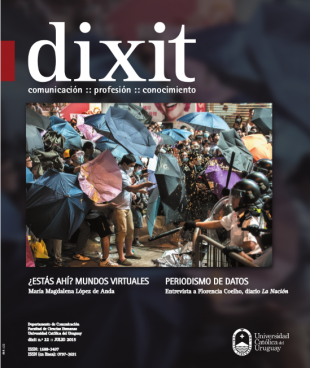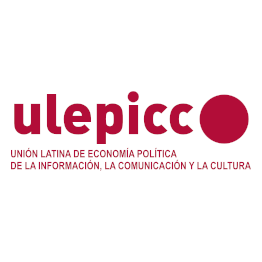
|
El Congreso Internacional Move.net -que se celebrará en el Paraninfo de la Universidad Pablo de Olavide de Sevilla el 5, 6 y 7 de febrero- contará con la presencia de destacados académicos y activistas de la tecnopolítica como Margarita Padilla, David Bravo, Juan Moreno Yagüe, Patricia Horrillo, Marta G. Franco, Manje, Alex Haché, Francisco Jurado o representantes de Nodo50, AgoraVoting, OpenKratio, Zemos98, Enreda, Ganemos Madrid, Radiopolis, la Red de Medios Comunitarios (ReMC) y la Coordinadora de Informática de la CGT. Desde la academia destaca la presencia de Francisco Sierra, Víctor Sampedro o Ángel Calle.
Se han aceptado finalmente 40 comunicaciones de 11 países y 31 Universidades y centros de investigación de España, Portugal, Italia, Dinamarca, Turquía, México, Colombia, Reino Unido, EEUU, Canadá y Sudáfrica, que confirman el carácter internacional del evento. Las comunicaciones serán presentadas en el Congreso y posteriormente los textos se publicarán en un Libro de Actas con licencia Creative Commons que contará también con textos y entrevistas a los activistas invitados. Además, el programa consta de 19 conferencias y 6 mesas redondas en las que se debatirá sobre ejes temáticos como la Soberanía Tecnológica, los Derechos Digitales, el Ciberactivismo, la Democracia Digital, el Open Data, la Cultura Digital, el Análisis Crítico de Internet o los Medios de Comunicación en la Red. También habrá espacio para 3 presentaciones de libros, un debate sobre las relaciones entre la Academia y los Movimientos Sociales y otro sobre Municipalismo y Política en la Red que contará con representantes de Podemos y Ganemos en varios territorios. La videoconferencia de apertura correrá a cargo del Director del Centro Internacional de Estudios Superiores de Comunicación para América Latina (CIESPAL), Francisco Sierra. El profesor de la Universidad de Córdoba Ángel Calle, el Catedrático de la Universidad Rey Juan Carlos Víctor Sampedro, el abogado especialista en propiedad intelectual y cultura libre David Bravo o la ingeniera informática, fundadora de Sindominio.net y autora de “El Kit de la lucha en Internet”Margarita Padilla protagonizarán algunas de las conferencias principales. El Paraninfo de la UPO será la sede principal, aunque algunas actividades se desarrollarán en la Librería la Fuga y el Congreso se trasladará en la tarde del sábado a Tramallol, donde tras la conferencia de cierre se celebrará una fiesta con música Copyleft. Los debates podrán seguirse también por streaming, a través de las cuentas del Congreso en las redes sociales o con el hashtag #Movenet. El PROGRAMA COMPLETO puede consultarse en https://congreso-move.net/programa
Sigue el congreso y difúndelo por tus redes!!! Twitter: Perfil: @CongresoMovenet Etiqueta: #Movenet Etiquetas Ejes Temáticos: #Ciberactivismo #CulturaDigital#DemocraciaDigital #DerechosDigitales #InternetCrítico #MediosEnRed #OpenData #SoberaníaTecnológica Facebook: Página: www.facebook.com/CongresoMove.Net Evento: https://www.facebook.com/events/1446922988875029/ Youtube: Canal: www.youtube.com/user/CongresoMovenet Contacto: info@congreso-move.net |
Nuevo contribudo científico de la Dra. Mar Llera en el volumen que ha sido publicado tanto en formato digital como impreso por la editorial Cognella bajo el título INTERCULTURAL COMMUNICATION FOR AN INCLUSIVE GLOBAL ORDER.
El Prof. Dr. Wenshan Jia, experto en sinología, traducción y comunicación intercultural de la Univ. Chapman (California, USA), acaba de publicar los resultados de un ambicioso proyecto en el que han participado destacados académicos de los cinco continentes, para analizar los actuales desafíos de la interculturalidad en los BRICS (Brasil, Rusia, India y China) y en otras regiones en desarrollo -como Oriente Medio-, en contraste con lo que sucede en Estados Unidos y en Europa.
La Profª Mar Llera, responsable del área de Estudios sobre Asia Oriental (China) de COMPOLÍTICAS, ha colaborado en la iniciativa con un capítulo que trata sobre el concepto de IN-BETWEENNES AS AN EMERGING PARADIGM IN INTERCULTURAL COMMUNICATION: THE ILLUSTRATIVE CASE OF CHINA.
Editorial Cognella: grabanera@cognella.com.
Acknowledgments
Preface
Part I. Introduction
1. The Various Streams of Cultural Dreams Discourse in the Contemporary World. By Wenshan Jia & Pierce Rothchild
Part II. Brazilian (Latin American) (Inter)Cultural Communication
1. The Business of Winning Brand Brazil and the New Globalism, 1990 – 2010. By Roger Kittleson
2. New Directions for a More Prosperous Brazil. By Thomas J. Trebat
Part III. Russian (Eurasian) (Inter) Cultural Communication
3. Where is the Common Ground? Interaction and Transfer Between European and Russian Philosophical Culture. By Evert Van der Zweerde
4. The Advantages of Employing Quantitative and Qualitative Methods in Intercultural Research Practical Implications from the Study of the Perceptions of Intercultural Communication Competence by American and Russian Managers. By Alexei V. Matveev
5. Rise of New Centres of Power in Eurasia Implications for Turkish Foreign Policy. By Emre Ersen
Part IV. Indian (Inter) Cultural Communication
6. Bangalore to Bengaluru-Garden City to Silicon Valley Scenes from a Rapidly Changing and Confl icted City Space. By Peter M. Kellett, Roy Schwartzman, and David Carlone
7. Empowering “Pub-going, Loose and Forward Women” to Rebel India’s Social Media Foster Activism and Exchange of Ideas. By Debashis Aikat
8. Bollywood and the Frictions of Global Mobility. By Nitin Govil Part
V. Chinese & East Asian (Inter) Cultural Communication
9. The Chinese Conceptualizations of Face Personhood, Communication and Emotions. By Wenshan Jia
10. “Face” (mianzi) Among the New Generation of Chinese Youth in Japan. By Kiyoko Sueda & Yue Wei
11. On the Communication Tactics and Grand Strategies of the Diaoyu/Senkaku Islands Disputants. By Dexin Tian
12. Soap Operas as a Matchmaker A Cultivation Analysis of the Effects of South Korean TV Dramas on Vietnamese Women’s Marital Intentions. By Hong Tien Vu and Tien-Tsung Lee
13. To Walk in Two Worlds The Impact of Social Media Consumption on Chinese Residents’ Acculturation into the American Society. By Cong Li and Yu Liu Part
VI. Middle East
14. Muslim Voices in the Blogosphere Mosaics of Local—Global Discourses. By Merlyna Lim
15. The Internet in Iran The Battle Over an Emerging Virtual Public Sphere. By Gholam Khiabany and Annabelle Sreberny
Part VII. Europe
16. What or Who Regulates European Electronic Media? By Kathy L. Hill and Aaron Manahan
17. Revoluntionary Reporting The Media, Democratization, and Eastern Europe . By Jane Curry
Part VIII. (South) African (Inter) Cultural Communication
18. A Network of Tongues African Languages, Multilingualism and Global Communication By Abiodun Salawu
19. Complicating What it Means to be South African? Investigating the Role of Blogs in Intercultural Communication. By Rick Malleus
20. South Africa in the BRICS Evolving International Engagement and Development. By Harvard International Review
21. Africa and the New World Order Voices and Way of Armah’s Osiris Rising. By Eric Edi
Part IX. BRICS
22. Socialisation as a Two-way Process Emerging Powers and the Diffusion of International Norms. By Xiaoyu Pu
23. The BRICs 12 Years in Review Which Countries Truly Dominate Emerging Markets? By James O’Neill
Part X. Challenges to the US as a Global Power
24. Why Do (We Think) They Hate Us Anti-Americanism, Patriotic Messages, and Attributions of Blame. By Jason Gilmore, Lindsey Meeks, and David Domke
25. The Literal-Visual Cross-Cultural Continuum as a Challenge to the U.S. Army in Relation to the Digital Disparity Existing Among it and Third World Allies. By Jim Schnell
Part XI. Intercultural/Global Communication Theory
26. In-Betweenness as an Emerging Paradigm in Intercultural Communication The Illustrative Case of China. By Mar Llera
27. Dwelling in Intercultural Spaces . Global Citizenship as a Mindset By Lily A. Arasaratnam
28. Maat and Human Communication Supporting Identity, Culture, and History Without Global Domination. By Molefi Kete Asante
29. Shifting Geertz Toward a Theory of Translocalism in Global Communication Studies . By Marwan M. Kraidy and Patrick D. Murphy
Part XII. Global Intercultural Competence, Training and Consulting
30. The Intercultural Profession in The Past Decade. By Anja Franz, Susan Salzbrenner, and Tanja Schulze
31. Leading Across Cultures in the Human Age An Empirical Investigation of Intercultural Competency Among Global Leaders. By Michael F. Tucker, Ron Bonial, Adam Vanhove, and Uma Kedharnath
32. Working with Multicultural Groups and Teams. By David C. Thomas and Kerr Inkson
33. Effective Organizational Consulting Across Cultural Boundaries A Case Focusing on Leadership Styles and Team-Building. By John Darling and Victor Heller
|
Reconocer el pensamiento de Malatesta en el “no nos representan” o las prácticas zapatistas en la reivindicación de la autogestión de espacios comunes supone no partir de cero en los habituales debates en torno a temas como el liderazgo, las relaciones afectivo-sexuales, las leyes…, sino aprovechar el legado anarquista para continuar definiendo una sociedad basada en la autoorganización, la democracia directa y el apoyo mutuo. Las reflexiones desde la práctica que se recogen en este libro sin duda enriquecerán las iniciativas actuales y también la investigación en ciencias sociales, mostrando que el pensamiento libertario no solo sigue vigente, sino que es la “estimulante ideología del futuro” que reivindica Carlos Taibo en el prólogo. Título: Miradas libertarias. PVP: 17.5 euros (IVA incluido) |
Nuevo contribudo científico de la Dra. Mar Llera en el volumen que ha sido publicado tanto en formato digital como impreso por la editorial Cognella bajo el título INTERCULTURAL COMMUNICATION FOR AN INCLUSIVE GLOBAL ORDER.
El Prof. Dr. Wenshan Jia, experto en sinología, traducción y comunicación intercultural de la Univ. Chapman (California, USA), acaba de publicar los resultados de un ambicioso proyecto en el que han participado destacados académicos de los cinco continentes, para analizar los actuales desafíos de la interculturalidad en los BRICS (Brasil, Rusia, India y China) y en otras regiones en desarrollo -como Oriente Medio-, en contraste con lo que sucede en Estados Unidos y en Europa.
La Profª Mar Llera, responsable del área de Estudios sobre Asia Oriental (China) de COMPOLÍTICAS, ha colaborado en la iniciativa con un capítulo que trata sobre el concepto de IN-BETWEENNES AS AN EMERGING PARADIGM IN INTERCULTURAL COMMUNICATION: THE ILLUSTRATIVE CASE OF CHINA.
Editorial Cognella: grabanera@cognella.com.
Acknowledgments
Preface
Part I. Introduction
1. The Various Streams of Cultural Dreams Discourse in the Contemporary World. By Wenshan Jia & Pierce Rothchild
Part II. Brazilian (Latin American) (Inter)Cultural Communication
1. The Business of Winning Brand Brazil and the New Globalism, 1990 – 2010. By Roger Kittleson
2. New Directions for a More Prosperous Brazil. By Thomas J. Trebat
Part III. Russian (Eurasian) (Inter) Cultural Communication
3. Where is the Common Ground? Interaction and Transfer Between European and Russian Philosophical Culture. By Evert Van der Zweerde
4. The Advantages of Employing Quantitative and Qualitative Methods in Intercultural Research Practical Implications from the Study of the Perceptions of Intercultural Communication Competence by American and Russian Managers. By Alexei V. Matveev
5. Rise of New Centres of Power in Eurasia Implications for Turkish Foreign Policy. By Emre Ersen
Part IV. Indian (Inter) Cultural Communication
6. Bangalore to Bengaluru-Garden City to Silicon Valley Scenes from a Rapidly Changing and Confl icted City Space. By Peter M. Kellett, Roy Schwartzman, and David Carlone
7. Empowering “Pub-going, Loose and Forward Women” to Rebel India’s Social Media Foster Activism and Exchange of Ideas. By Debashis Aikat
8. Bollywood and the Frictions of Global Mobility. By Nitin Govil Part
V. Chinese & East Asian (Inter) Cultural Communication
9. The Chinese Conceptualizations of Face Personhood, Communication and Emotions. By Wenshan Jia
10. “Face” (mianzi) Among the New Generation of Chinese Youth in Japan. By Kiyoko Sueda & Yue Wei
11. On the Communication Tactics and Grand Strategies of the Diaoyu/Senkaku Islands Disputants. By Dexin Tian
12. Soap Operas as a Matchmaker A Cultivation Analysis of the Effects of South Korean TV Dramas on Vietnamese Women’s Marital Intentions. By Hong Tien Vu and Tien-Tsung Lee
13. To Walk in Two Worlds The Impact of Social Media Consumption on Chinese Residents’ Acculturation into the American Society. By Cong Li and Yu Liu Part
VI. Middle East
14. Muslim Voices in the Blogosphere Mosaics of Local—Global Discourses. By Merlyna Lim
15. The Internet in Iran The Battle Over an Emerging Virtual Public Sphere. By Gholam Khiabany and Annabelle Sreberny
Part VII. Europe
16. What or Who Regulates European Electronic Media? By Kathy L. Hill and Aaron Manahan
17. Revoluntionary Reporting The Media, Democratization, and Eastern Europe . By Jane Curry
Part VIII. (South) African (Inter) Cultural Communication
18. A Network of Tongues African Languages, Multilingualism and Global Communication By Abiodun Salawu
19. Complicating What it Means to be South African? Investigating the Role of Blogs in Intercultural Communication. By Rick Malleus
20. South Africa in the BRICS Evolving International Engagement and Development. By Harvard International Review
21. Africa and the New World Order Voices and Way of Armah’s Osiris Rising. By Eric Edi
Part IX. BRICS
22. Socialisation as a Two-way Process Emerging Powers and the Diffusion of International Norms. By Xiaoyu Pu
23. The BRICs 12 Years in Review Which Countries Truly Dominate Emerging Markets? By James O’Neill
Part X. Challenges to the US as a Global Power
24. Why Do (We Think) They Hate Us Anti-Americanism, Patriotic Messages, and Attributions of Blame. By Jason Gilmore, Lindsey Meeks, and David Domke
25. The Literal-Visual Cross-Cultural Continuum as a Challenge to the U.S. Army in Relation to the Digital Disparity Existing Among it and Third World Allies. By Jim Schnell
Part XI. Intercultural/Global Communication Theory
26. In-Betweenness as an Emerging Paradigm in Intercultural Communication The Illustrative Case of China. By Mar Llera
27. Dwelling in Intercultural Spaces . Global Citizenship as a Mindset By Lily A. Arasaratnam
28. Maat and Human Communication Supporting Identity, Culture, and History Without Global Domination. By Molefi Kete Asante
29. Shifting Geertz Toward a Theory of Translocalism in Global Communication Studies . By Marwan M. Kraidy and Patrick D. Murphy
Part XII. Global Intercultural Competence, Training and Consulting
30. The Intercultural Profession in The Past Decade. By Anja Franz, Susan Salzbrenner, and Tanja Schulze
31. Leading Across Cultures in the Human Age An Empirical Investigation of Intercultural Competency Among Global Leaders. By Michael F. Tucker, Ron Bonial, Adam Vanhove, and Uma Kedharnath
32. Working with Multicultural Groups and Teams. By David C. Thomas and Kerr Inkson
33. Effective Organizational Consulting Across Cultural Boundaries A Case Focusing on Leadership Styles and Team-Building. By John Darling and Victor Heller












